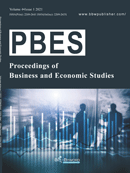Abstract
Based on the data from Chinese Family Panel Studies (CFPS), this study uses the Tobit model to empirically analyze the influence of financial literacy on family cultural consumption. This study found that the average financial literacy level of Chinese residents is still relatively low. The improvement of their financial literacy would help enhance the household cultural consumption expenditure. From this study, it is recommended that there should be an improvement in the cultural consumption of Chinese families and their quality of life by targeting financial education, raising the income level of residents, and stimulating the residents’ cultural consumption willingness.
References
Veblen T, 1899, Mr. Cummings’s Strictures on “The Theory of the Leisure Class”. Journal of Political Economy, 8(1): 106-117.
Cameron S, 1990, The Demand for Cinema in the United Kingdom. Journal of Cultural Economics, 14(1): 35-47.
Liu T, Song B, 2020, Research on the Leisure Consumption of Migrant Workers’ Family from the Perspective of New Urbanization – Based on the Analysis of Income Effect and Cultural Effect. Rural Economy, 2020(12): 77-86.
Yang J, Huang X, Li X, 2008, Educational Inequality and Income Distribution Gap: An Empirical Analysis of China. Management World, 2008(01): 38-47, 187.
Lu L, 2009, The Regional Difference and Dynamic Effect Analysis of the Influencing Factors of Cultural Consumption of Rural Residents. Statistics and Decision, 2009(09): 81-83.
Zeng Y, Liu X, 2020, Research on the Impact of Government Public Cultural Expenditure on Family Cultural Consumption – Based on the Analysis of Chinese Family Tracking Survey. Consumer Economy, 36(02): 29-39.
Zhong F, Li S, 2021, The Impact of Urban Residents’ Household Registration Differences on Cultural Consumption – Based on the Analysis of China’s Comprehensive Social Survey Data. Consumer Economy, 2021: 1-12.
Lusardi A, Mitchell OS, 2007, Baby Boomers Retirement Security: The Role of Planning, Financial Literacy and Housing Wealth. Journal of Monetary Economics, 54: 205-224.
Yin Z, Song Q, Wu Y, Peng C, 2015, Financial Knowledge, Entrepreneurial Decision-Making and Entrepreneurial Motivation. Management World, 2015(01): 87-98.
Qin F, Wang W, He J, 2016, The Influence of Financial Knowledge on Participation in Commercial Insurance – An Empirical Analysis of Data from the China Household Finance Survey (CHFS). Financial Research, 2016(10): 143-158.
Song Q, Wu Y, Yin Z, 2017, Research on Household Credit Behavior from the Perspective of Financial Knowledge. Financial Research, 2017(06): 95-110.
Hu Z, Zang R, 2017, Research on the Impact of Financial Literacy on Family Financial Planning – Micro-evidence from Chinese Urban Households. Journal of Central University of Finance and Economics, 2017(02): 72-83.
Shan D, 2019, Financial Literacy and Urban Poverty. China Industrial Economics, 2019(04): 136-154.
Yin Z, Song Q, Wu Y, 2014, Financial Knowledge, Investment Experience and Household Asset Selection. Economic Research, 49(04): 62-75.
Hong Y, 2017, Major Innovations in China’s Economic Development Theory After Entering a New Stage. China Industrial Economics, 2017(05): 5-15.
Meng H, Yan X, 2019, Financial Literacy, Household Leverage and Household Consumption. Financial Development Research, 2019(12): 30-39.
